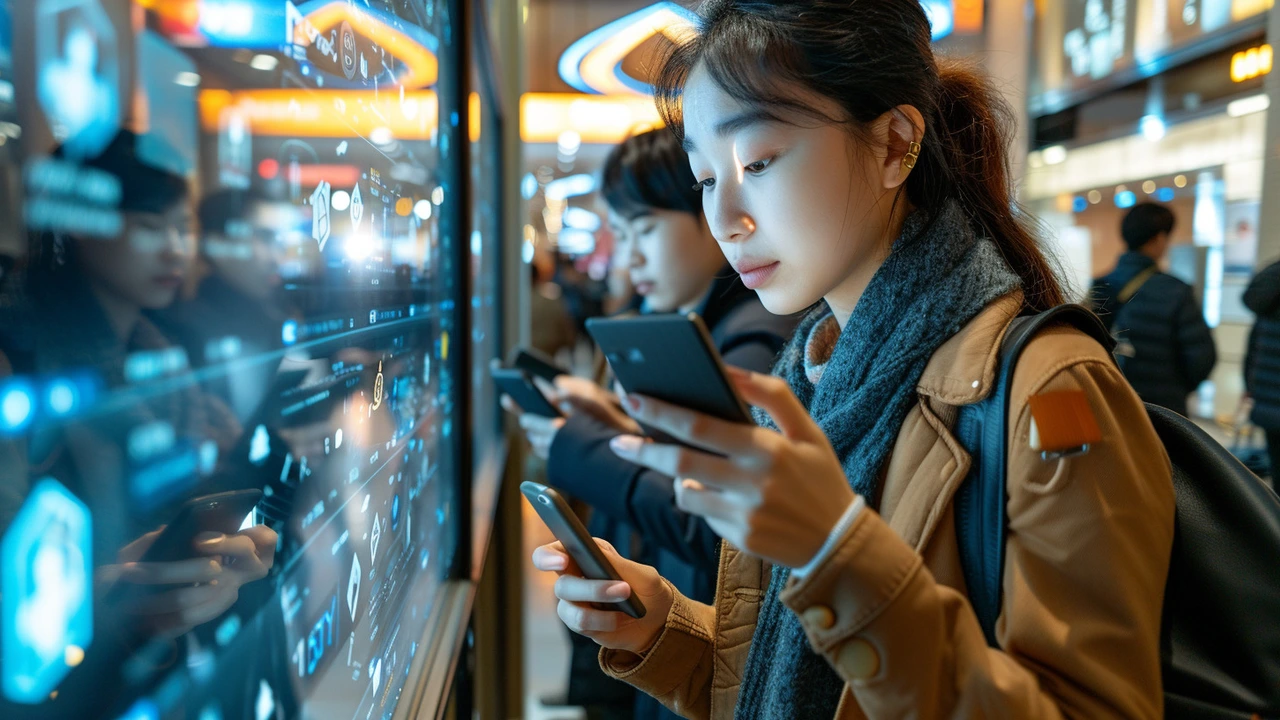Harnessing ChatGPT for Innovative Advertising: The Next Wave in Digital Marketing

As the digital world evolves, so do the tools we use to engage with potential customers. Among these innovative tools, ChatGPT stands out as a particularly transformational technology in the realm of advertising. By leveraging its advanced capabilities, marketers are finding new ways to enhance their campaign strategies and connect with audiences more effectively.
ChatGPT, equipped with the power of AI, is not just about automating tasks; it's about creating a more dynamic, responsive, and personalized marketing landscape. This opens incredible opportunities for brands to craft messages that resonate on a personal level with consumers, potentially changing the face of digital marketing as we know it.
- Introduction to ChatGPT
- Benefits of ChatGPT in Advertising
- Creating Engaging Content with AI
- Personalizing Customer Interactions
- Optimizing Campaign Performance
- Implementing ChatGPT in Your Marketing Strategy
Introduction to ChatGPT
In an era where digital advancements are synonymous with competitive advantages, ChatGPT emerges as a frontline innovation. Developed by OpenAI, ChatGPT is a variant of the GPT (Generative Pre-trained Transformer) models, renowned for their deep learning capabilities in understanding and generating human-like text. This tool is not merely about processing information but about understanding context, making it a valuable asset in crafting personalized communication in advertising.
ChatGPT's training involved devouring a vast dataset of text from the internet, enabling it to learn a wide array of language patterns, nuances, and information. This extensive training allows ChatGPT to generate coherent and contextually relevant responses based on the input it receives. Personalized advertising thus takes on a new dimension as marketers can utilize this sophisticated AI to create messages that resonate strongly with individual consumers, based on patterns and interactions that the model has learned.
The technology’s flexibility extends to various sectors, from generating creative content for campaigns to automating customer service interactions, thereby enhancing efficiency and engagement. As businesses seek to connect with their audiences on a deeper level, the role of AI like ChatGPT in understanding customer preferences and behaviors becomes increasingly critical. It adapts continuously to new data, improving its accuracy and relevance in real-world applications, illustrating a perfect blend of technology with practicality in the modern marketing strategy.
One notable instance of ChatGPT's application can be observed in how eCommerce giants personalize shopping experiences. Shoppers receive product recommendations and promotional content that feel exceptionally tailored to their tastes and previous shopping behavior. Here, ChatGPT assists in analyzing customer data to predict future buying patterns and suggest relevant advertisements which can significantly boost conversion rates.
"AI is the most profound technology introduced to society, and ChatGPT is at the forefront of this transformation," says tech industry analyst Frank Thompson.
Indeed, as digital marketing becomes more data-driven and nuanced, the abilities of AI models like ChatGPT to understand, predict, and engage customers through refined, intelligent interactions will only become more integral to marketing success. Companies utilizing this technology are not just streamlining operations; they are setting new benchmarks for customer engagement and brand loyalty.
Benefits of ChatGPT in Advertising
The advent of ChatGPT in the advertising industry represents a paradigm shift, especially when it comes to understanding and engaging consumers. By leveraging the sophisticated language processing capabilities of ChatGPT, marketers can now craft messages that are not only compelling but also highly relevant to their target audiences. This AI tool processes vast amounts of data to predict and adapt to consumer preferences, thus facilitating the creation of tailored messages that resonate with individuals on a personal level.
One of the foremost advantages of using ChatGPT in advertising is its capacity to scale operations without compromising the quality of interaction. Traditional methods often fall short when trying to maintain a consistent brand voice across all communications, but ChatGPT can manage thousands of conversations simultaneously, ensuring a uniform brand presence. The technology can be applied across various platforms, from social media ads to customer service chats, maintaining a coherent voice and message that strengthens brand identity.
The efficiency brought by ChatGPT isn't just about handling multiple tasks. It also lies in its ability to learn and optimize from interactions in real-time. For instance, it can analyze which types of messages elicit the strongest engagement and refine its approach accordingly. This constant learning process not only ensures better communication strategies but also helps in budget allocation by pointing out the most effective tactics, leading to higher returns on investment.
ChatGPT's impact on creative processes is particularly noteworthy. It aids in generating a wide array of ideas and concepts, which can be vital during brainstorming sessions. This not only streamlines the creative process but also enhances the creativity of marketing campaigns by offering insights that might not be immediately apparent to human marketers. As a result, campaigns become not only faster to market but also more innovative, appealing to a broader audience.
Finally, the integration of ChatGPT in advertising helps bolster customer service and support. By automating responses and handling routine inquiries, it allows human agents to focus on more complex and sensitive issues, thus improving overall customer satisfaction. For customers, this means quicker responses and more accurate information at their fingertips, enhancing the overall user experience with the brand.
Creating Engaging Content with AI
In today's fast-paced digital arena, the pressure on marketers to deliver fresh and engaging content consistently can be overwhelming. This is where artificial intelligence, specifically ChatGPT, becomes a game-changer. AI tools like ChatGPT not only assist in generating content swiftly but also ensure it resonates well with the target audience by analyzing vast amounts of data for better audience understanding. This ability to quickly produce high-quality content can significantly boost a brand's content marketing strategy.
One of the standout features of using ChatGPT in content creation is its capacity to adapt to different styles and tones, suitable for varied audiences and platforms. Whether it's a blog post, a social media update, or an email newsletter, ChatGPT can tailor its output to meet the specific needs of each format, maintaining a brand's voice consistently across all channels. This versatility is invaluable in crafting a cohesive brand identity that consumers can recognize and trust.
Furthermore, ChatGPT's deep learning algorithms help in predicting trends and consumer preferences, which can directly influence the themes and topics of the content created. Businesses can stay ahead of the curve by producing content that is not only timely but also prophetic, anticipating and addressing consumer needs before they become mainstream demands. This proactive approach to content creation can establish a brand as a thought leader in its industry.
Despite the strides AI has made in content creation, human oversight remains crucial. Marketers need to fine-tune the AI-generated content to ensure it aligns with their brand's ethics and audience's expectations. This symbiotic relationship between AI and human creativity leads to the production of compelling, authentic content that engages audiences deeply. Leveraging AI like ChatGPT effectively requires an understanding of its capabilities and limitations, and incorporating it thoughtfully into the content strategy framework can yield substantial dividends.
As we look to the future, the role of AI in content creation is only expected to grow, making it an indispensable tool for digital marketers. The companies that recognize this potential and invest in AI technology like ChatGPT will likely see significant advantages over competitors, achieving greater efficiency and relevance in their digital communication strategies. Thus, embracing AI in content creation is not just about keeping up with trends but setting the pace for what is possible in digital marketing.
Personalizing Customer Interactions
In the bustling world of digital marketing, the ability to personalize communications with customers is not just nice to have; it's an essential component of effective advertising. The rise of artificial intelligence, particularly through tools like ChatGPT, has empowered marketers like never before, enabling a level of personalization that was once the stuff of dreams. From tailoring email marketing campaigns to adjusting ads based on user behavior, ChatGPT allows for a refined approach that speaks directly to the individual interests and needs of each customer.
Imagine a scenario where every ad a customer sees, every email they receive, is crafted to align with their specific tastes and shopping habits. ChatGPT analyzes data regarding past purchases, browsing history, and even social media activity to create a detailed profile of consumer preferences. This wealth of information is then used to customize marketing messages that are relevant and appealing to each recipient. The key here is relevance; a term that in today's marketing world translates directly to engagement and, ultimately, sales.
This kind of targeted communication does more than just increase sales; it builds a bond between brand and consumer. Customers feel understood and valued, which can lead to increased loyalty and long-term engagement. By integrating ChatGPT into their strategies, businesses can transform their interactions from generic touchpoints into meaningful conversations. The AI's ability to learn and adapt over time means that these interactions only become more personalized, more engaging, and more effective as more data is collected.
According to recent studies, personalized emails deliver six times higher transaction rates, but 70% of brands fail to use them. The adoption of intelligent technologies like ChatGPT in personalizing interactions is not just a trend; it's a shift towards creating more meaningful and effective marketing communications.
Moreover, personalizing content isn't restricted to digital interactions. Physical stores can use AI to enhance in-store experiences as well. For instance, digital kiosks can offer personalized recommendations based on the customer's online shopping behavior. All these touchpoints create a unified brand experience that drives customer satisfaction and reinforces brand loyalty.
But the real ingenuity of using ChatGPT in advertising lies not only in its ability to analyze and process vast amounts of data but in its capacity to act on this data in real time. For marketers, this means being able to deliver the right message, to the right person, at the right moment, maximally boosting the chances of converting interest into tangible action. As we move to a more connected and data-driven world, the possibilities for customization and personalization in advertising seem limitless.
Optimizing Campaign Performance
When diving into the world of advertising with tools like ChatGPT, the ultimate goal for many is optimizing campaign performance. Traditional methods often involve a mix of guesswork and reactive adjustments. However, the integration of AI technologies such as ChatGPT empowers businesses to take a proactive approach, leveraging data-driven insights for refined strategy planning. This is not just about reaching more eyes; it's about reaching the right eyes at the opportune moment, thereby increasing engagement and conversion rates.
One of the key features of ChatGPT in optimizing campaigns is its ability to analyze vast amounts of data quickly and accurately. Marketers can use these insights to identify trends, understand consumer behavior, and tailor their campaigns to meet the evolving preferences of their target audience. This capability allows for the continuous refinement of messaging and strategy, which can lead to significantly improved outcomes. Equally important is the AI’s capacity to test different approaches simultaneously, providing valuable A/B testing data without additional costs or time investments.
For instance, a retail company could employ ChatGPT to craft personalized emails that resonate more deeply with each segment of its customer base. By analyzing past purchase behaviors and interaction data, ChatGPT can generate content that feels individually tailored. Personalized marketing is proven to enhance customer engagement and loyalty, as well as increase sales. A/B testing strategies facilitated by AI can determine the most effective approach, fine-tuning these personal touches to perfection.
In addition to customization and efficiency, monitoring and adjusting campaigns in real time is another crucial benefit of using ChatGPT. This dynamic approach to advertising management ensures that strategies remain flexible and adaptable to external changes, such as shifts in market conditions or consumer interests. It’s this agility that can provide a significant edge in competitive markets.
Moreover, implementing ChatGPT can reduce operational costs related to market research and consumer analysis. The automation of these tasks frees up resources, allowing teams to focus on creative and strategic endeavors. This not only boosts the efficiency of marketing teams but also enhances their capability to innovate and think outside the box, driving forward the overall brand strategy.
Implementing ChatGPT in Your Marketing Strategy
Integrating ChatGPT into your marketing strategy might seem daunting at first, but with a structured approach, it can significantly enhance your digital marketing efforts. At its core, ChatGPT can automate and personalize communication at a scale previously unattainable for many businesses. First and foremost, it’s essential to understand the specific marketing goals you aim to achieve with AI technology. Whether it's increasing engagement, generating leads, or improving customer service, having a clear objective will guide the deployment of ChatGPT effectively.
To begin with, small-scale pilot projects are an excellent way to test the waters. Start by integrating ChatGPT into one aspect of your marketing, such as customer service or content creation. Monitor the performance closely using analytics tools to understand how well it engages with your audience and meets business objectives. Gradual implementation helps in pinpointing what works best and provides invaluable feedback for refining the approach.
Training your ChatGPT model to suit your specific needs is equally important. The more data it is fed, the better it performs. This involves not only technical data but also industry-specific insights that help the AI understand your audience better. For instance, feeding it with past customer interactions can help in crafting responses that are not only relevant but also personalized, elevating the customer experience significantly.
Collaboration between your marketing and IT departments is crucial for successful integration. Marketing professionals provide insights into what’s needed from a business perspective, while IT professionals handle the technical implementation. Ensuring that both teams work cohesively will facilitate a smoother integration of ChatGPT into your systems.
Finally, it's vital to stay updated with the latest developments in AI and machine learning. The landscape is constantly evolving, and new upgrades can offer improved functionalities that might be beneficial for your marketing strategy. Embracing continuous learning and adaptability will help you not only implement but also continuously enhance your ChatGPT-driven initiatives.



